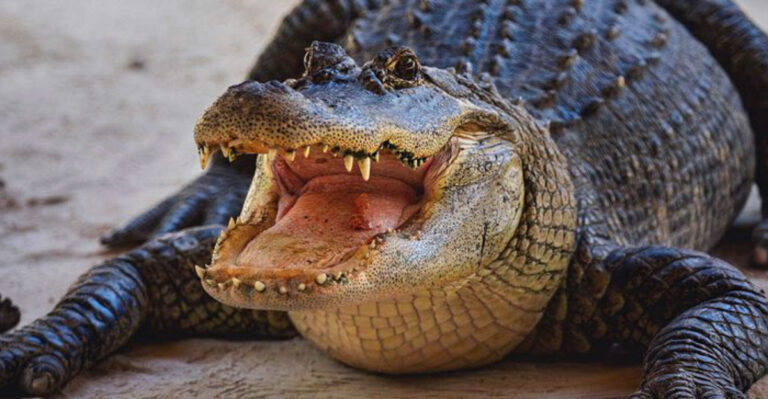10 Easy and Healthy Homemade Cat Meal Ideas Vets Approve
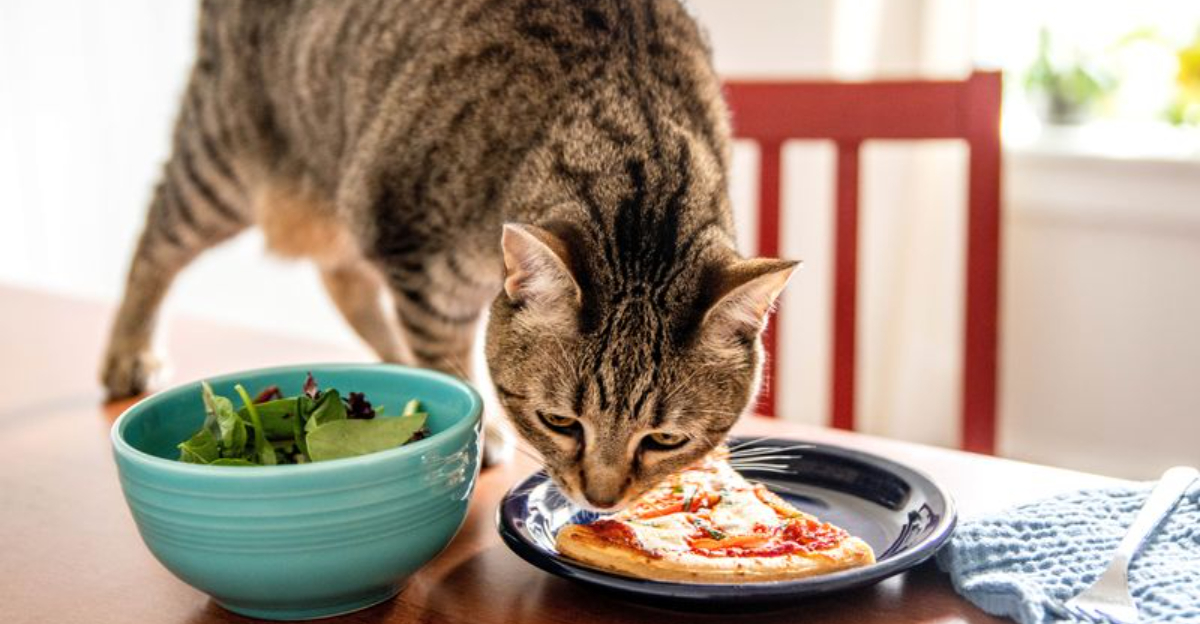
Feeding your cat nutritious homemade meals can be a rewarding way to support their health while knowing exactly what goes into their food.
Many cat owners worry about commercial pet foods containing preservatives or fillers that might not benefit their feline friends.
The good news is that with a little know-how, you can prepare vet-approved meals right in your kitchen that will have your kitty purring with delight.
1. Chicken And Rice Bowl
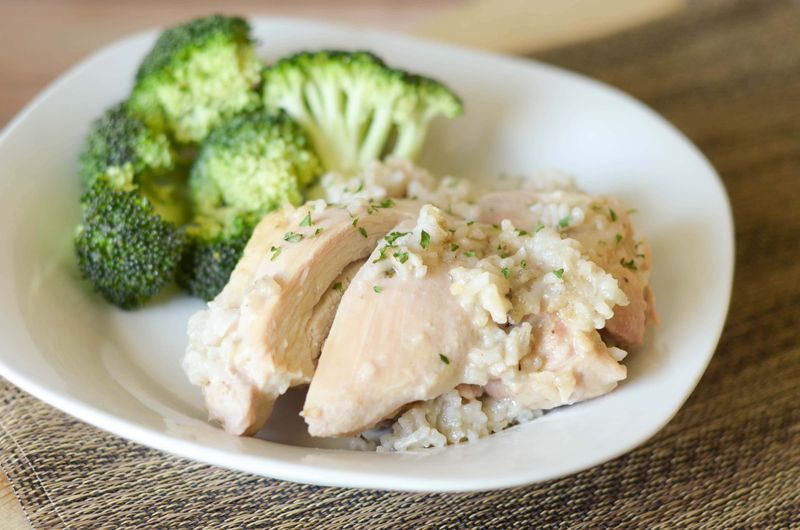
Boneless, skinless chicken combined with plain white rice creates a gentle meal for sensitive feline stomachs. This simple combo provides lean protein and easy-to-digest carbohydrates that many veterinarians recommend for cats recovering from digestive upsets.
Always cook the chicken thoroughly to kill any harmful bacteria, and avoid seasoning with salt, garlic, or onions which are toxic to cats. The rice should be fully cooked and cooled before serving.
For added nutrition, mix in a small amount of steamed carrots or pumpkin puree – both provide fiber and vitamins that support digestive health. This meal can be prepared in batches and refrigerated for up to three days.
2. Venison And Peas Fresh Mix
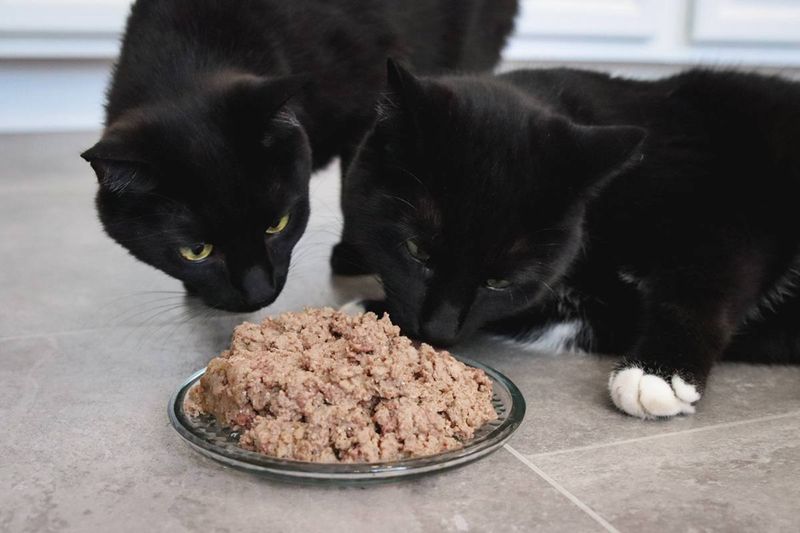
Ground venison offers a novel protein source perfect for cats with allergies to common meats. This lean game meat provides high-quality protein without the fat content of beef, making it ideal for weight-conscious felines.
Cook venison thoroughly without added fats or seasonings. Mix with a small amount of cooked, mashed green peas for fiber and additional nutrients that support digestive health. Veterinary dermatologists often recommend venison for cats suffering from food-related skin issues or digestive sensitivities.
The unique protein structure is less likely to trigger allergic reactions than more common meat sources. This meal freezes well in individual portions, making it convenient for busy pet parents.
3. Salmon Patties
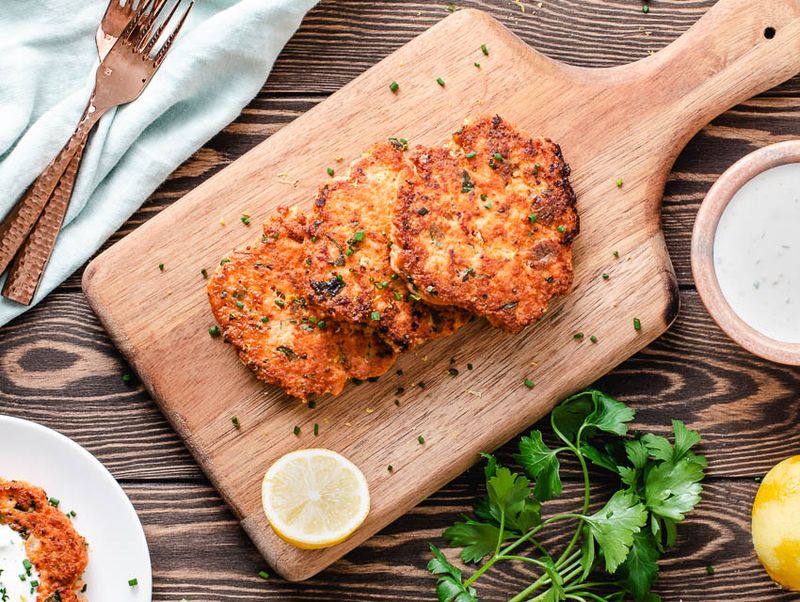
Fresh salmon packed with omega-3 fatty acids supports your cat’s skin health and coat shine. Mash cooked salmon with a small amount of mashed sweet potato and form into cat-sized patties that can be refrigerated and served over several days.
Remove all bones before preparing – even tiny fish bones can cause choking or internal damage. Wild-caught salmon typically contains fewer contaminants than farm-raised varieties, making it a healthier choice for your feline friend.
Many veterinarians praise fish-based homemade meals for older cats particularly, as the anti-inflammatory properties of omega-3s can help with joint health. Serve at room temperature for maximum aroma appeal that will entice even picky eaters.
4. Turkey And Pumpkin Delight
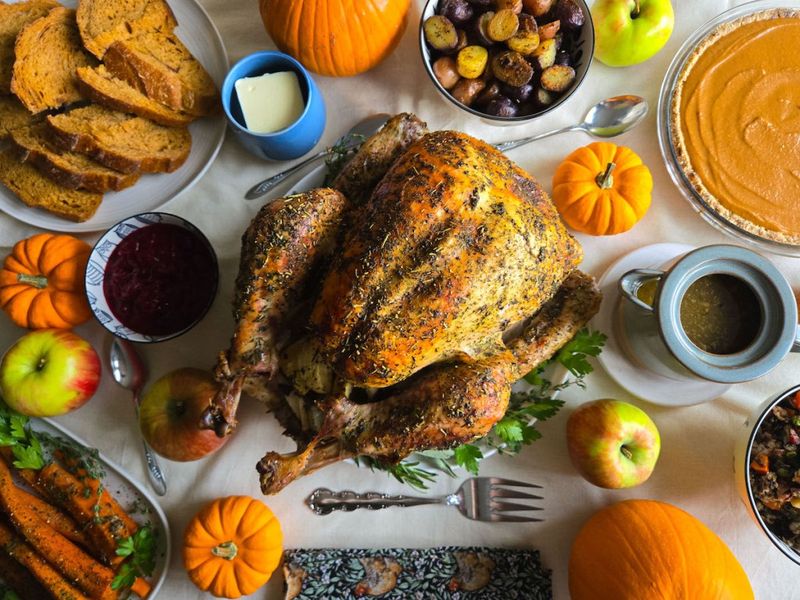
Ground turkey provides lean protein that’s gentle on feline digestive systems while being packed with essential nutrients. When combined with plain canned pumpkin (not pie filling), this meal supports healthy digestion and can help regulate both constipation and diarrhea in cats.
Lightly cook the turkey without oils or seasonings until no pink remains. Mix with pumpkin at a ratio of about 4:1 turkey to pumpkin for the perfect consistency.
Veterinarians often recommend this combination for cats with sensitive stomachs or those recovering from digestive issues. The mild flavor appeals to most cats, and the meal can be frozen in small portions for convenient feeding later.
5. Egg And Cottage Cheese Breakfast
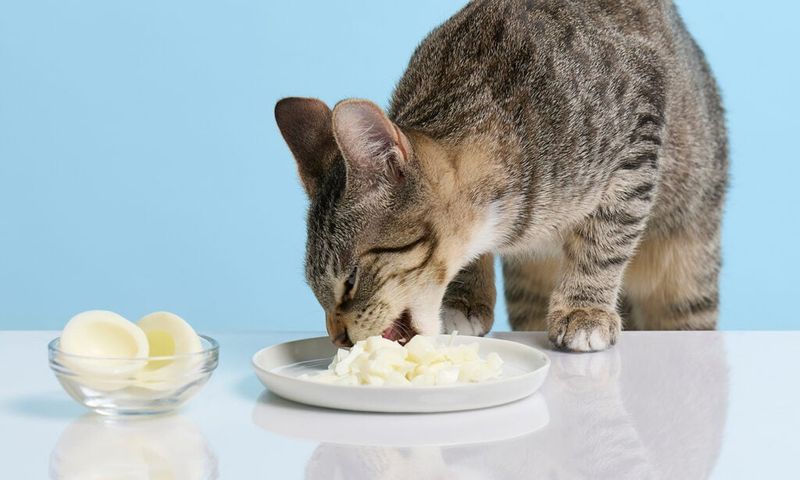
Scrambled eggs provide complete protein with all essential amino acids cats need for muscle maintenance. When paired with small-curd cottage cheese, this breakfast delivers calcium and additional protein in a form many cats find irresistible.
Cook eggs thoroughly without butter or seasonings, as plain as possible. Mix with a spoonful of cottage cheese (choose varieties without added salt or flavorings) while the eggs are still warm to create a soft, moist texture.
This protein-rich meal makes an excellent occasional breakfast treat that many veterinarians approve for healthy adult cats. The high biological value of egg protein means it’s easily utilized by your cat’s body, supporting overall health while satisfying their carnivorous nutritional needs.
6. Beef And Veggie Meatballs
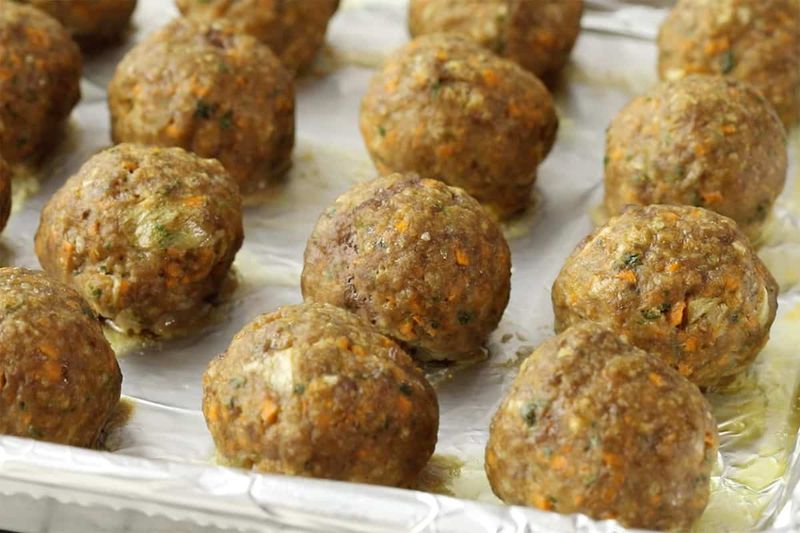
Lean ground beef provides iron and protein that helps maintain your cat’s muscle mass and energy. These tiny meatballs incorporate finely chopped spinach and carrots, sneaking valuable nutrients into a form cats actually enjoy eating.
Form mixture into marble-sized balls perfect for feline portions. Bake until fully cooked without any pink remaining, then cool completely before serving. Veterinary nutritionists appreciate this recipe because it balances animal protein with plant nutrients in a cat-friendly package.
The meatballs freeze beautifully – just thaw overnight in the refrigerator for convenient meal prep. Many cats who typically avoid vegetables will happily consume them in this disguised form.
7. Tuna And Sweet Potato Mash
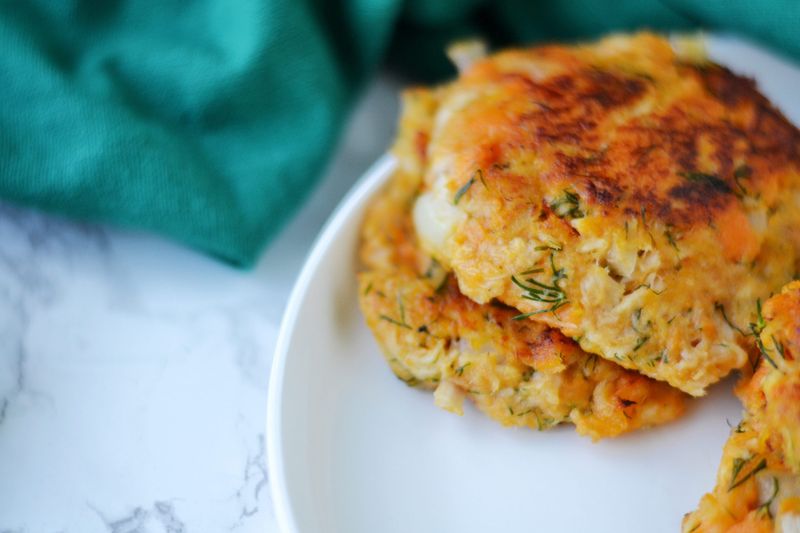
Water-packed tuna (not oil-packed) provides lean protein and enticing aroma cats rarely resist. Mixed with cooked, mashed sweet potato, this meal delivers beta-carotene and fiber alongside high-quality protein. Drain tuna thoroughly to remove excess sodium.
The sweet potato should be baked or boiled until very soft, then cooled and mashed without any additions – no butter, salt, or spices. Veterinarians recommend this combination for its balance of protein and complex carbohydrates that provide sustained energy.
The natural sweetness of the potato often appeals to cats while adding valuable nutrients not found in meat alone. Serve in small portions as occasional treats rather than daily meals to avoid mercury concerns.
8. Rabbit And Zucchini Stew
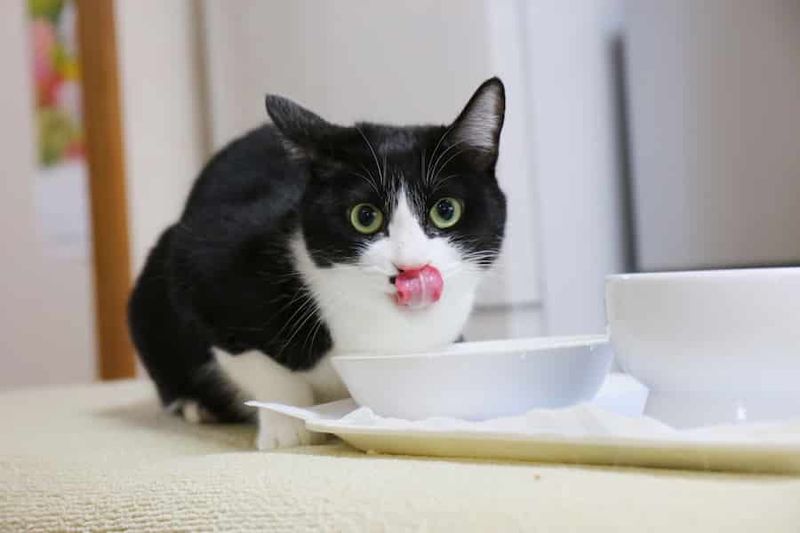
Farm-raised rabbit mimics what cats might naturally hunt, making it biologically appropriate protein many veterinarians recommend. This lean meat combines with finely diced zucchini in a broth made from the cooking liquid, creating a moisture-rich meal that supports urinary health.
Cook rabbit thoroughly without bones, then shred into cat-bite-sized pieces. The zucchini should be cooked until very soft so it’s easily digestible for your carnivorous companion. This novel protein source works well for cats with food sensitivities to more common meats like chicken or beef.
The high moisture content makes this recipe particularly beneficial for cats prone to urinary issues or those who don’t drink enough water on their own.
9. Liver And Oatmeal Power Blend
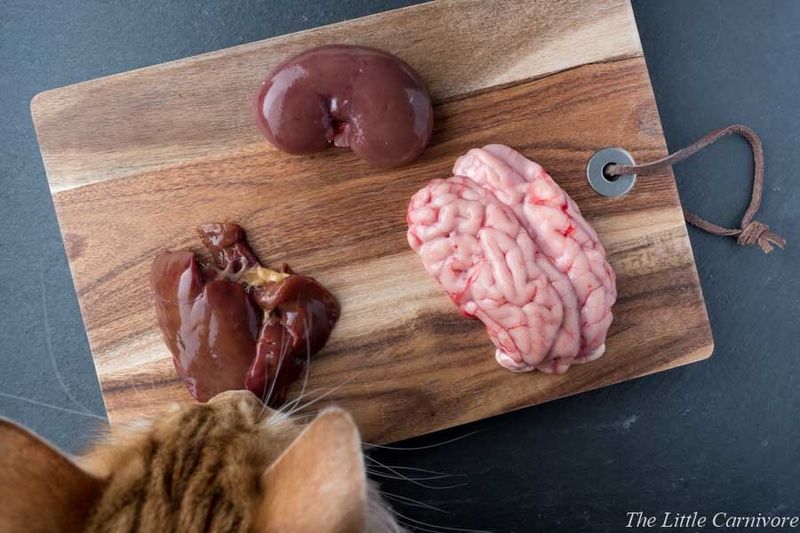
Chicken liver delivers concentrated nutrition including vitamin A, iron and essential B vitamins that support your cat’s vision and energy levels. When paired with plain cooked oatmeal, this power-packed meal provides both quick and sustained energy sources.
Lightly cook the liver until just done – overcooking destroys valuable nutrients. Chop finely and mix with a small amount of cooled, plain cooked oatmeal made with water only.
Veterinary nutritionists caution that liver should be limited to once weekly feedings due to its high vitamin A content, which can build up to toxic levels if overfed.
This nutrient-dense meal particularly benefits senior cats or those recovering from illness who need concentrated nutrition in smaller portions.
10. Mackerel And Brown Rice Dinner
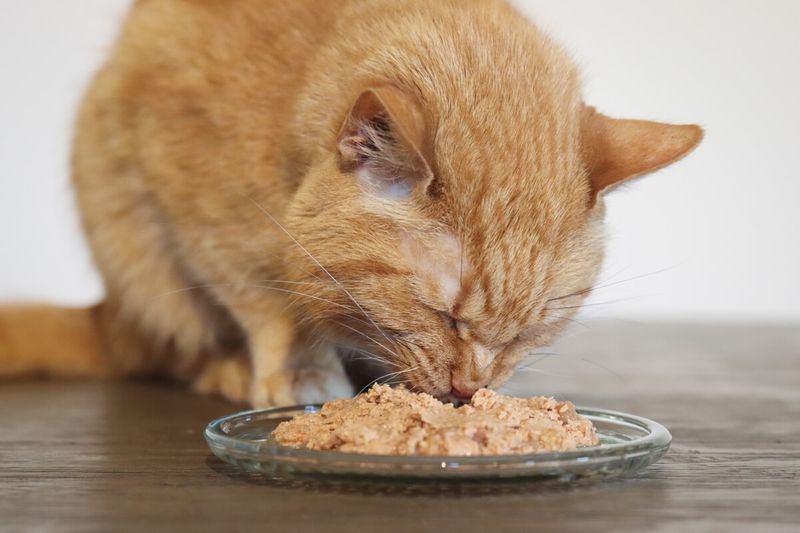
Canned mackerel in water provides omega-3 fatty acids and protein in a shelf-stable form that’s easy to keep on hand. Paired with fiber-rich brown rice, this combination supports digestive regularity and heart health that veterinarians often recommend for adult cats.
Rinse canned mackerel to reduce sodium content before mixing with fully cooked, cooled brown rice. The rice should be cooked until very soft for maximum digestibility. This meal’s strong fish aroma typically appeals even to finicky eaters.
The omega-3 fatty acids support brain function, reduce inflammation, and promote a healthy, shiny coat. For cats with grain sensitivities, quinoa makes an excellent rice substitute while maintaining the recipe’s nutritional profile.



